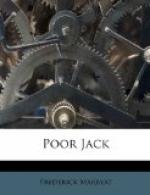VOLUME TEN
Frontispiece—Poor Jack
Fisher’s Alley
I summoned all my strength, and called out long before
we floated past her
Anderson reading the Bible to Jack
Anderson reading the news of the Battle of the Nile
Jack’s Father landing after the Battle of the
Nile
Jack in Nanny’s Room
Jack and Bramble aboard the Indiaman
The Fore-peak Yarn
“How’s her head, Tom?”
Bramble saving Bessie
Jack heaving the lead
Nanny relating her story
Jack and his Father under the Colonnade
A Surprise
Bramble and Jack carried into a French Port
The Leith Smack and the Privateer
The Arrival of the Privateer at Lanion
The Prison
Jack a Prisoner
The Escape
Wreck of the Galley
We found both Bramble and Bessy clinging to the rope
Bramble had knelt by the bedside, and was evidently
in prayer
I went down to the beach, ... and I was soon on board
“Mr. Saunders, ... may I ask where you procured
this spy-glass?”
Sir J. O’Connor and Mrs. St. Felix
I met face to face a Frenchman
POOR JACK
CHAPTER ONE
In which, like most
People who tell their own Stories, I begin with
the Histories of other
People.
I have every reason to believe that I was born in the year of our Lord 1786, for more than once I put the question to my father, and he invariably made the same reply: “Why, Jack, you were launched a few months before the Druids were turned over to the Melpomene.” I have since ascertained that this remarkable event occurred in January 1787. But my father always reckoned in this way: if you asked him when such an event took place, he would reply, so many years or months after such a naval engagement or remarkable occurrence; as, for instance, when I one day inquired how many years he had served the King, he responded, “I came into the sarvice a little afore the battle of Bunker’s Hill, in which we licked the Americans clean out of Boston[1].” As for Anno Domini, he had no notion of it whatever.
[Footnote 1: I have since heard a different version of the result of this battle.]
Who my grandfather was, I cannot inform the reader, nor is it, perhaps, of much consequence. My father was a man who invariably looked forward, and hated anything like retrospection: he never mentioned either his father or his mother; perhaps he was not personally acquainted with them. All I could collect from him at intervals was, that he served in a collier from South Shields, and that a few months after his apprenticeship was out, he found himself one fine morning on board of a man-of-war, having been picked up in a state of unconsciousness, and hoisted up the side without his knowledge or consent. Some people may infer from this that he was at the time tipsy; he never told me so; all he said was,




